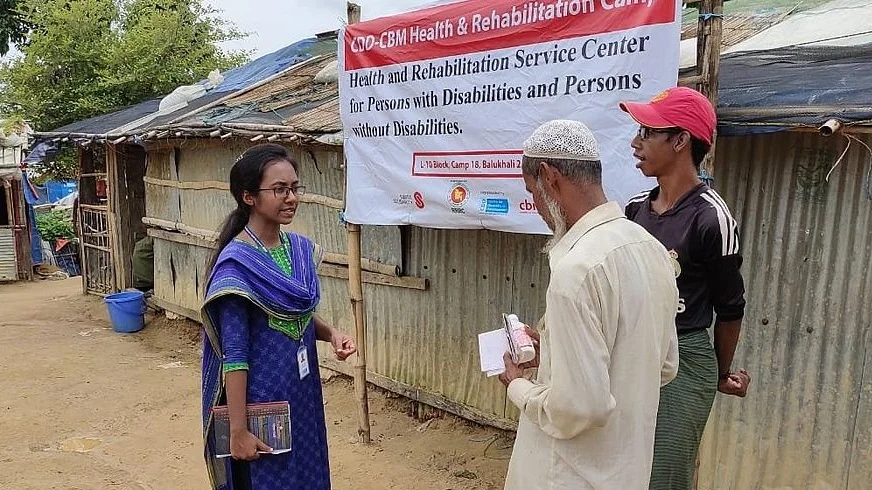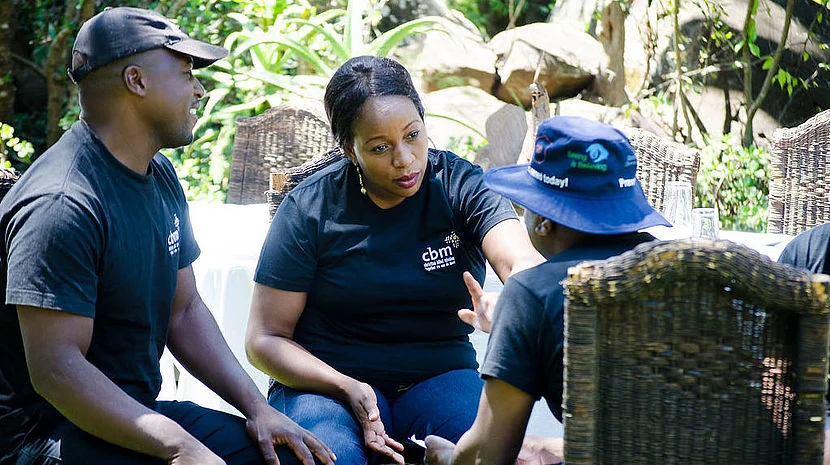Celebrating World Humanitarian Day
Every 19 August, World Humanitarian Day is set aside to honor humanitarian efforts made around the globe and to assert the need for supporting people in crisis.
This year, World Humanitarian Day 2019 is celebrating women humanitarians and their contributions toward making the world a better place. At CBM, we would like to highlight the work of two women working in crisis situations: Tahmida from Bangladesh and Deborah from Zimbabwe.
Tahmida Akter discusses feedback and complaint mechanisms with persons with disabilities from the Rohingya population in the Cox's Bazaar refugee camp. July 2019. ©CBM
Tahmida Akter is in Inclusion Coordinator for CBM partner Centre for Disability in Development (CDD) in Cox’s Bazaar, Bangladesh. There she works to support the inclusion of older persons and persons with disability in response to the Rohingya crisis.
Tahmida coordinates disability mainstreaming projects and provides technical support within the refugee camp, as well as managing a team of inclusion officers. She also works with humanitarian agencies so they can access the support for disability mainstreaming her team provides.
One of the biggest challenges Tahmida faces is the lack of training or knowledge among humanitarian actors on how to include people with disabilities in the work they carry out.
Yet, Tahmida is resolute despite the challenges she faces. She enjoys advocating and promoting disability inclusion among humanitarian agencies and finding contextual solutions. She says:
“I hope and believe that government and humanitarian agencies will be more aware and continue to show more willingness to increase disability mainstreaming. I also hope that people with disabilities will get more opportunities to strengthen their representation in disability mainstreaming and inclusion, and will therefore be more involved in global development.”
Farayi Makwanya (right), Deborah Tigere (CBM Zimbabwe Country Director), and Michael Mavhima in Harare during a team building activity in February 2019. ©CBM
Deborah Tigere is CBM Country Director in Zimbabwe. In the Manicaland and Masvingo Provinces, Deborah has been working hard with CBM partners to implement an inclusive response to the devasting Cyclone Idai.
Cyclone Idai’s mudslides, misty weather and continuous rainfall made rescue operations and access to affected areas highly difficult. Most challenging was obtaining access to information in affected populations to determine the type of assistance needed.
Deborah was instrumental in CBM’s inclusive humanitarian efforts to provide food and assistive devices after the cyclone, and to provide support for other humanitarian actors to mainstream disability in their response.
Deborah’s work is important to ensuring that people with disability are more included in development and humanitarian response in the future. As she says:
“In light of the disaster, my thoughts as a development worker are centred around inclusive disaster preparedness plans, e.g. establishment of accessible early warning systems and capacity building of communities to cope. Effective prepared plans will save more lives and minimise the impact.”
Disability in emergency situations:
The World Health Organization estimates that 15 percent of the global population live with disability. In any emergency or disaster, people who live with some form of disability are disproportionally affected. Reasons for this include inaccessibility of warning messages and emergency shelters, loss and damage of assistive devices, disruption of support networks and increased difficulty in accessing basic humanitarian operations (food, water, shelter, sanitation and health care services). At the same time, emergencies can increase the number of people who experience disability, both short and long-term, due to injuries sustained and lack of effective medical services.
That’s why CBM aims to ensure all planning for and responses to emergency situations are inclusive of persons with disabilities and more at-risk persons and their families.
If you would like to support CBM’s Humanitarian work, you can do so by clicking here!
(originally published: https://www.cbm.org/news/news/news-2019/cbm-celebrates-world-humanitarian-day-by-recognising-humanitarians/)

